by Molly Jameson | May 23, 2018
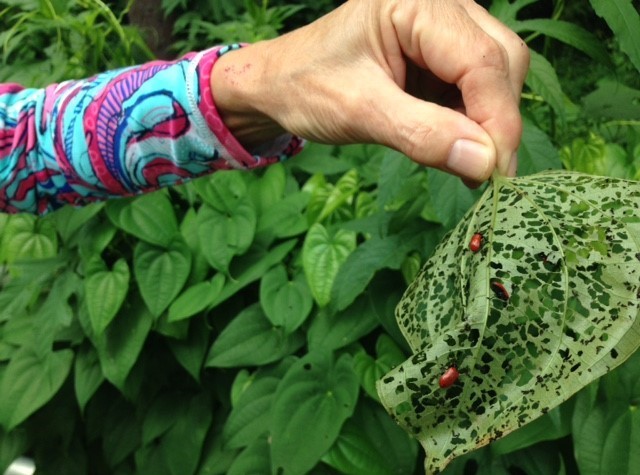
Air potato leaf beetle attacking the invasive air potato plant.
Air potatoes got you down? Have no fear, for the Air Potato Challenge is coming to Leon County!
Register now to attend the Air Potato Challenge event on May 18, 9 a.m. to 12 p.m. at the FAMU Center for Viticulture and Small Fruit Research (6361 Mahan Drive, Tallahassee, FL) and receive a supply of air potato beetles to use on your property.
After years of testing, air potato beetles became available as a biological control in 2012 to help combat the invasive herbaceous perennial air potato vine (Dioscorea bulbifera). Air potatoes arrived in south Florida from China in the early 1900s and have steadily crept north until they are now invading the Panhandle Region. Fortunately, air potato beetles have dietary requirements that are very specific, relying strictly upon air potatoes to complete their life cycles.
This is why a team of researchers and Extension agents have come together to help spread air potato beetles as a biological control strategy. Many agencies and counties are involved in this effort, including UF/IFAS Extension St. Lucie County, UF/IFAS Indian River Research and Education Center, the Florida Department of Agriculture Division of Plant Industry, the USDA, Florida Fish and Wildlife, UF/IFAS Extension Leon County, and Florida A&M University.
From 9 a.m. to noon on May 18, Florida residents and public land managers are invited to come out to the FAMU Center for Viticulture and Small Fruit Research to get more information about the invasive air potato and its biological controller, the air potato beetle, and receive a supply of beetles to use on their properties. Please pre-register on the Eventbrite page (https://www.eventbrite.com/e/may-18-2018-air-potato-challenge-leaf-beetles-available-for-the-public-leon-county-fl-tickets-44793035174).
You can find more information about air potatoes and air potato beetles on the UF/IFAS Solutions for Your Life Air Potato Biological Control page (http://bcrcl.ifas.ufl.edu/airpotatobiologicalcontrol.shtml).
What: Air Potato Challenge
Where: FAMU Center for Viticulture and Small Fruit Research, 6361 Mahan Drive, Tallahassee, FL
When: May 18, 2018, 9 a.m. to 12:00 p.m.
Cost: Free of charge, but please pre-register
Registration: https://www.eventbrite.com/e/may-18-2018-air-potato-challenge-leaf-beetles-available-for-the-public-leon-county-fl-tickets-44793035174
by Matt Lollar | Feb 14, 2018
Register today for the 2018 Panhandle Fruit & Vegetable Conference! The Panhandle Fruit & Vegetable Conference is scheduled for February 19th & 20th. On the 19th we will go on an afternoon farm tour in Baldwin County, AL that will end with dinner (included) at Auburn University’s Gulf Coast Research and Extension Center in Fairhope. Educational sessions with guest speakers from University of Florida, Auburn University, and Texas A&M University will be held on February 20th where topics will include Citrus Production, Vegetable Production, Protected Ag Production, Marketing/Business, Food Safety, and Fruit & Nut Production. A full list of topics can be found here. Fifty dollars (plus $4.84 processing fee) covers the tour and dinner on the 19th and educational sessions, breakfast, and lunch on the 20th! The complete agenda is now available. Use your mouse or finger to “click” on the image below for full screen viewing.
Make sure to register by Wednesday, February 14th! – Registration Link
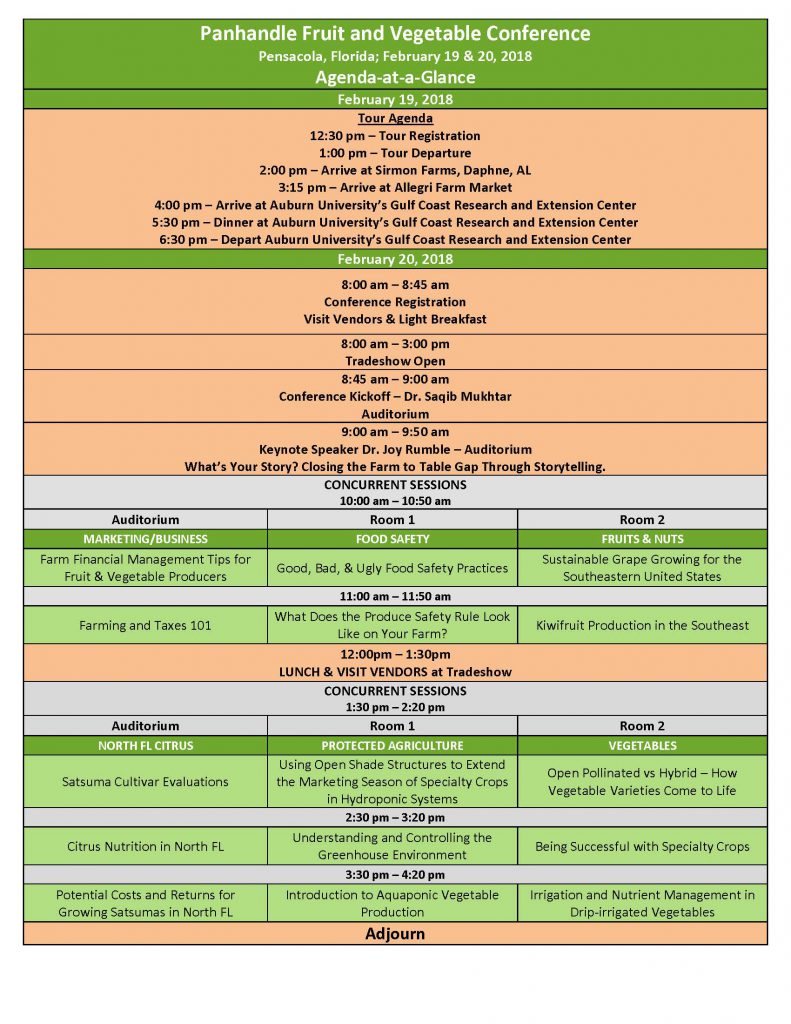
by Molly Jameson | Jan 10, 2018
Every gardener should know a thing or two about farming. Join UF/IFAS Extension at the 2018 Panhandle Fruit and Vegetable Conference to not only learn about market vegetable production, fruit and nut production, and much more, but also to attend the pre-conference farm tour and listen to a speech by the Keynote Speaker, Dr. Joy Rumble, an Assistant Professor in the Department of Agricultural Education and Communication at the University of Florida.
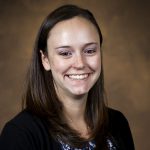
Dr. Joy Rumble, the 2018 Panhandle Fruit and Vegetable Conference Keynote Speaker.
Dr. Rumble is originally from Mount Gilead, Ohio. She earned a bachelor of science degree from The Ohio State University, majoring in animal science. During her undergraduate studies, Dr. Rumble raised livestock, worked as an intern on two large swine operations, and served as a summer intern for the USDA Farm Service Agency. She earned a master of science degree in agricultural communication and continued her education at the University of Florida, where she graduated with her doctorate in agricultural education and communication in 2013.
Dr. Rumble is now an Assistant Professor and Extension Programming Coordinator with the University of Florida. Her research focus is effective communication and raising awareness of agricultural and natural resources issues within the agricultural industry. She concentrates many of her outreach initiatives at the UF/IFAS Center for Public Issues Education in Agriculture and Natural Resources (PIE Center).
At the PIE Center, Dr. Rumble strives to measure knowledge, behaviors, and perceptions of agriculture of Florida constituents and responds to the many economic, environmental, and social challenges we face within the state. She often shares her findings through the Easy as PIE webinar series to allow both the public and Florida’s policymakers to make informed decisions to preserve the assets of the state’s agricultural and natural resources. Most recently, Dr. Rumble was a speaker for an Easy as PIE webinar to discuss a statewide strategic plan for agritourism.
Dr. Rumble’s service as the UF/IFAS Extension Programming Coordinator creates improved citizen awareness of agriculture and natural resources through UF/IFAS County Extension Offices.
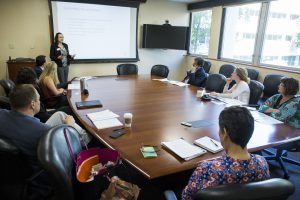
Dr. Rumble assisting with a UF/IFAS campus tour for Florida Senator Bill Nelson’s staff on October 18th, 2016.
Make plans to attend the 2018 Panhandle Fruit and Vegetable Conference on Tuesday, February 20, from 8 a.m. to 5 p.m., at the University of West Florida Conference Center (11000 Conference Parkway, Building 22) in Pensacola, Florida. You will learn about the importance of agricultural communication from Dr. Rumble directly, and attend conference educational tracts on North Florida Citrus Production, Fruit and Nut Production, Vegetable Production, Marketing, Food Safety, and Protected Agriculture. The conference will also provide an opportunity for networking and give you a chance to meet farmers from across our region.
Also included in the conference ticket price is the pre-conference “Buy Local” farm tour on Monday, February 19, 1 p.m. to 8 p.m. Tour buses will start out at the University of West Florida and will make three stops, traveling to the Gulf Coast Research and Extension Center in Fairhope, Alabama, a hydroponic vegetable farm in Daphne, Alabama, and the Allegri Farm Market, also in Daphne, Alabama.
For more information and registration visit https://pfvc2.eventbrite.com. Early bird registration is $50 (+ service fee), before February 1, 2018. Your registration includes continental breakfast, lunch, refreshments, educational materials, and transportation to the farm tour locations. We look forward to seeing you there!
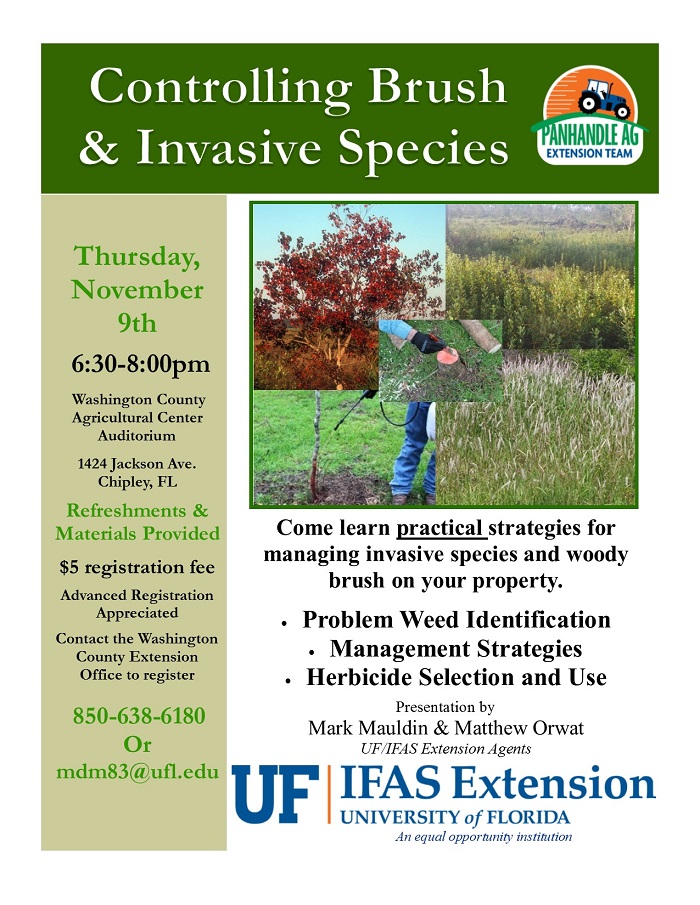
by Matthew Orwat | Oct 26, 2017
Encroaching brush, whether native or invasive, can be a problem for properties large and small. Fighting woody brush and other hard-to-kill weed species can be challenging for property owners. Many factors affect the effectiveness and efficiency of control efforts.
Timing of the application is a key factor that many property owners fail to consider. The cooler, fall and winter months are an excellent time to control a wide variety of troublesome brush species. With this in mind, the Washington County Extension Agents will be presenting a class, Controlling Brush & Invasive Species on November 9, 2017. The class will focus on plant identification and specific chemical control strategies that are effective in the fall and winter months. Herbicide selection and application techniques will be addressed in detail.
Controlling Brush & Invasive Species will be held at the Washington County Agricultural Center (1424 Jackson Ave., Chipley, FL) on Thursday, November 9, 2017 at 6:30 in the evening. Refreshments and printed reference materials will provided. There is a $5 registration fee for the class, payable at the door. Advanced registration for the class is appreciated. If you have questions or would like to register please contact Mark Mauldin at the Washington County Extension Office (850-638-6180 or mdm83@ufl.edu).

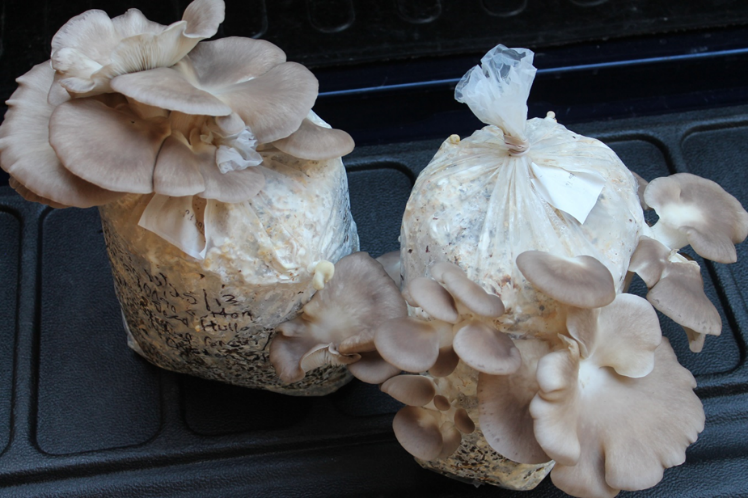
by Matt Lollar | Oct 24, 2017
The Jackson County Master Gardeners are hosting a hosting a Mushroom Growing Workshop on Saturday, November 18 at the Jackson County Extension Office, 2741 Penn Ave., Marianna, FL.

MUSHROOM GROWING WORKSHOP
SATURDAY, NOVEMBER 18
9:00 AM to 2:00 PM
• Learn to grow oyster mushrooms.
• Learn about mushroom nutrition.
• Learn to culture your own mushroom spawn.
• Take home two inoculated mushroom bags!
• A home cooked lunch is included!
Registration Fee $20.00
Includes Lunch
Space is Limited
Bring a jar of peanut butter to donate to the Backpack for KIDS program and you will be entered in a special raffle!
To register, contact the Extension Service at (850)482-9620 or s.farr@ufl.edu.
Pre-register by November 16th.
by Molly Jameson | Sep 18, 2017
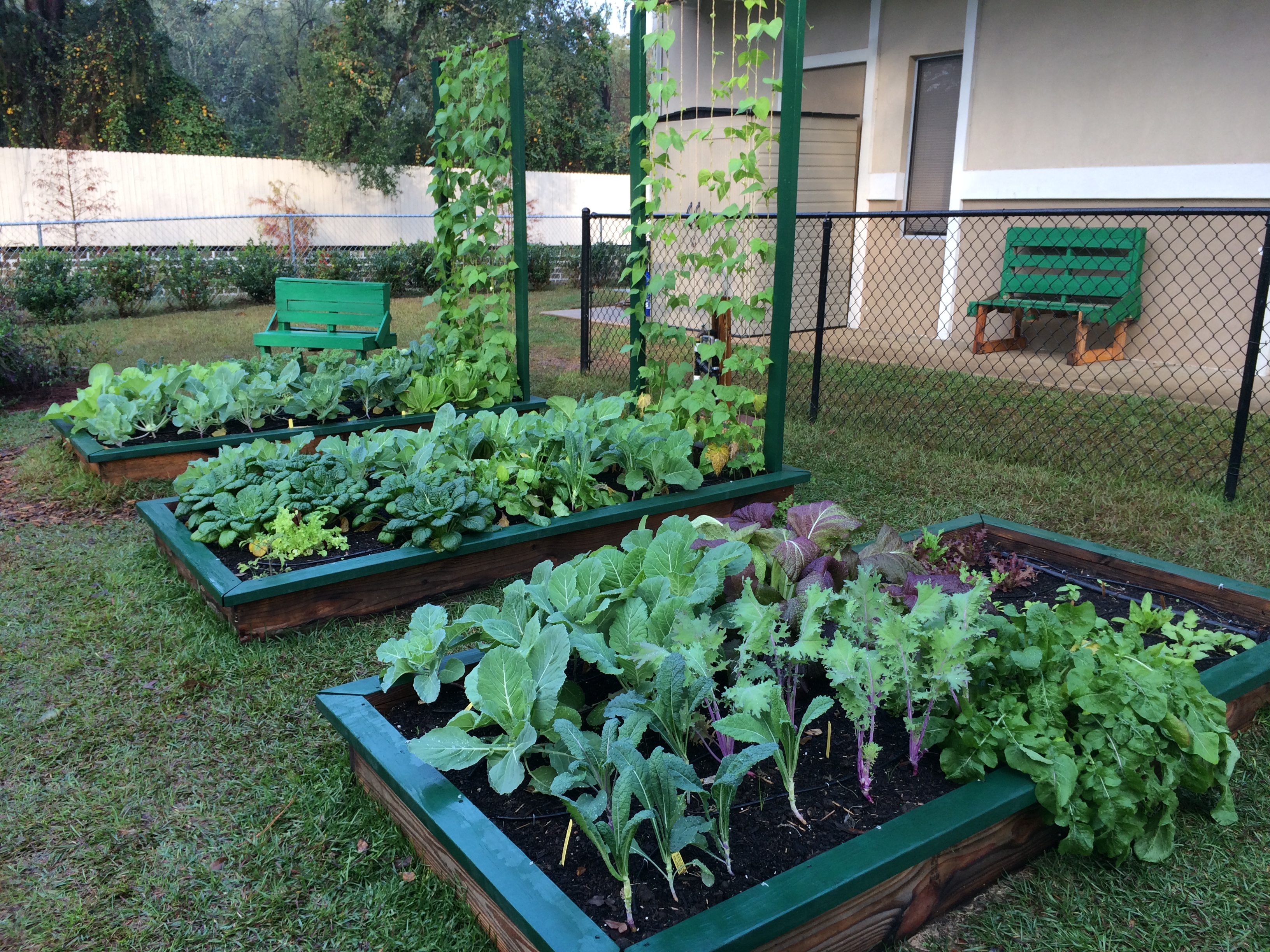
The Garden Educator Training Series helps garden leaders start or improve their school or community garden. Photo by Molly Jameson.
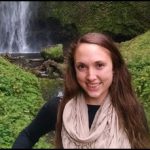
By Tiffany Torres
Tiffany Torres is the Family Nutrition Program Northwest District Food Systems Specialist with UF/IFAS Extension.
With the cooler months of fall upon us, school gardens across the Panhandle are beginning to awaken from their summer slumber. Soon, students and teachers will begin to replenish the soil, plant their seeds, and dive into an engaging edible education experience.
For these schools and communities, gardens are much more than just a few beds of carrots. School gardens serve as outdoor classrooms, bringing academic concepts to life in new and exciting ways, while also encouraging environmental stewardship. In addition, school gardens can expose students to lifelong healthy eating habits by inspiring them to try new fruits and vegetables. In time, the school garden can become a facet of school culture and pride, ultimately reinforcing an overall healthier school food environment for students, teachers, parents, and the broader community.
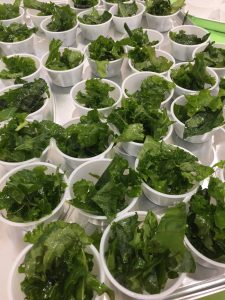
School gardens can inspire students to try foods, impacting their eating habits long-term. Photo by Molly Jameson.
To help support teachers and other school garden stakeholders on this journey, specialists at the University of Florida IFAS Extension Family Nutrition Program developed a seasonal school and community garden training. The “Garden Educator Training Series” provides teachers and volunteers with tools for improving school garden education, enjoyment, and long-term outcomes. This monthly education and networking opportunity welcomes teachers who want to start and sustain school gardens, college students who want to volunteer with local gardening projects, and other garden enthusiasts, such as Master Gardeners, who want to lend their time to ensure the success of school and community gardens.
Each session includes three engaging components: 1) seasonally relevant, hands-on gardening skills; 2) curriculum and education connections; and 3) community organizing strategies to build team commitments. Sessions also include an opportunity to share successes and challenges amongst fellow attendees, resulting in a stronger school and community garden network. Each garden project leader will build a “Living History Binder,” which they will fill with resources throughout the series and use with their team to help organize their garden projects.
Through the Garden Educator Training Series, it is our hope that everyone involved will gain tangible and valuable skills to launch or improve their school or community garden projects. The program will give educators the tools necessary to design their gardens to be outdoor classrooms; promote health and wellness through gardening; facilitate community engagement; and teach students valuable life skills such as teamwork, cooperation, focus, and patience – inspiring the next generation of “garden leaders, not just garden weeders.”
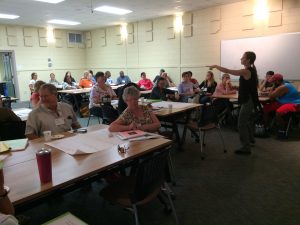
The Series provides teachers and volunteers networking opportunities and tools to improve school garden education. Photo by Molly Jameson.
Interested in participating in the Garden Educator Training Series? The Series is free of charge, and will take place at the Leon County Extension Office (615 Paul Russell Rd, Tallahassee, FL). Fall sessions are 4:30 to 6:30 p.m. on September 14th, October 12th, November 9th, and November 30th. To register, visit the UF/IFAS Leon County Eventbrite website (https://leongetsfall2017.eventbrite.com).
For further information, please contact the UF/IFAS Extension Office at Leon County by calling (850) 606-5200.










